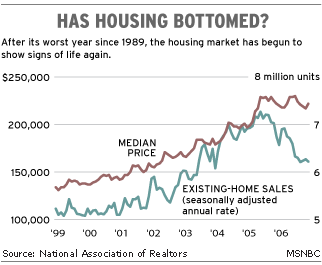
The housing market, once again, is making headlines. Well, if you don't count the State of the Union Address, which I don't. Here are some recent news blurbs concerning the State of the Housing Market, which will continue to effect us all. Much more than some lame duck.
"Make housing part of stimulus, NAR Says...The federal economic stimulus package under discussion by President Bush and Congress should loosen constraints on Fannie Mae and Freddie Mac to help make homeownership more widely available to households, NAR says. "Any stimulus package must address housing issues and increase the conforming loan limits for these two government-sponsored enterprises," says NAR President Dick Gaylord. NAR has been calling on Congress and the administration to increase the loan limits for Fannie Mae and Freddie Mac from the ceiling of $417,000 to $625,000. Doing so would reduce the supply of homes on the market by more than a month, strengthen home prices by 2-3 percentage points, and increase economic activity by $42 billion, NAR estimates. Foreclosures could also be reduced by 140,000 to 210,000 and result in an additional 348,000 home sales. )"- The Ohio Association of Realtors.
Above is a link to the news about CountryWide, the well known controversial mortgage lender. As you may know, it was purchased by Bank of America. For good or evil? You decide.
'“It looks to me as though maybe we haven't reached the complete bottom yet, but we're in the bottoming phase right now,” he said.
But the latest data don’t help forecasters much. Since July, the median price of existing homes has trended lower, but it ticked up slightly in December. And while sales volume began perking up in late 2006, a 0.8 percent drop in last month has some analysts rethinking the notion that the market had bottomed out.
“I still think there's further downside risk,” said Richard Berner, chief U.S. economist at Morgan Stanley. “And the reason is that it has become a buyer’s market with the imbalance between supply and demand both for new and existing homes out there.”
The supply of unsold homes — which soared to more than seven months worth of inventory for single-family homes from four months at the start of 2005 — has come down a bit. But it’s not clear whether the market is getting back on its feet or sellers have decided to pull their homes off the market and try again when the market improves.'- By John W. Schoen Senior Producer MSNBC updated 6:34 p.m. ET, Thurs., Jan. 25, 2007.
But the latest data don’t help forecasters much. Since July, the median price of existing homes has trended lower, but it ticked up slightly in December. And while sales volume began perking up in late 2006, a 0.8 percent drop in last month has some analysts rethinking the notion that the market had bottomed out.
“I still think there's further downside risk,” said Richard Berner, chief U.S. economist at Morgan Stanley. “And the reason is that it has become a buyer’s market with the imbalance between supply and demand both for new and existing homes out there.”
The supply of unsold homes — which soared to more than seven months worth of inventory for single-family homes from four months at the start of 2005 — has come down a bit. But it’s not clear whether the market is getting back on its feet or sellers have decided to pull their homes off the market and try again when the market improves.'- By John W. Schoen Senior Producer MSNBC updated 6:34 p.m. ET, Thurs., Jan. 25, 2007.
More gloom and doom? Well, we need to be realistic. The single largest contributing factor in the housing slump is the simple principle of supply and demand. Of course, why there is more supply than demand is a bit more complicated. Foreclosures and the threat of foreclosure, due to greedy lenders and a false sense of security amongst them, has contributed greatly to the glut on the market.
The Fed recently lowered interest rates by 3/4% and it is rumored that there may soon be another 1/2% decrease. What does that mean to mortgage rates? Diddly. That lowered rate affects what one bank lends to another, sometimes to increase their on-hand reserves which is mandated by the Fed. Sound like a game of round robin. Yep.
So, if you have bad credit or no money to spend, the interest rate means nothing to you.
But hang in there, folks. If you are in trouble with your credit card company, you can call them and negotiate a different interest rate or payment. The same goes for your mortgage lender. Call them. I can't reiterate that enough. If this whole mess is going to turn around, we have to take advantage of all resources. Every little bit helps. Don't wait for the ones with all the power and money to come knocking on your door to help you. They are only worried about themselves. YOU have to take charge, be brave and take charge.
Knowledge is power. Al Gore invented the internet for a reason.










No comments:
Post a Comment